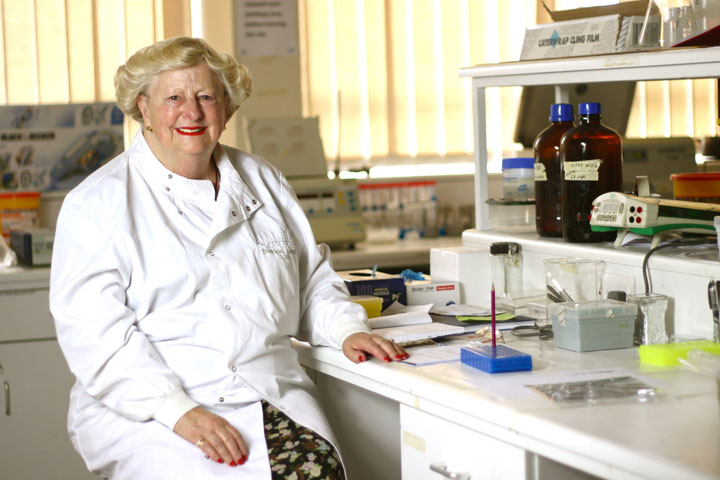A career dedicated to a test for early cancer detection
Diana Anderson, Professor in biomedical sciences at the University of Bradford, shares the story of her life's research work leading to the invention of a single test to detect cancer.
Diana's medicine research career started at the University of Manchester with a PhD.Following a stint in Australia, she came back to the UK to continue her interest in cancer.
In 1974 Diana was appointed as Head of Mutagenesis Studies at ICI's Central Toxicology Laboratory. Here, she did a study with the company to explore a potential connection between possible cancer in workers and the plastic products they were handling. The study established little connection, but led to Diana's discovery of damaged chromosomes present in cancer patients, which went on to shape the rest of her future research.

Diana Anderson, Professor in Biomedical Sciences
It would be very satisfying if I saw the test used in hospitals and GP's surgeries to help predict cancer quickly and in the early stages for individuals, young and old.
Professor Diana Anderson
Diana continued to expand on her cancer knowledge gained at ICI whilst working with BIBRA in London from 1981. She had the freedom to choose her research focus and spent time exploring cancer using animal and human studies, in migraine sufferers, and in women who use health clubs. Towards the end of her time here, she set up the Comet assay, named due to its similarity to a comet. The shape and length of the tail relates to DNA damage. Healthy chromosomes have no Comet tails, or very small ones.
In 2000, Diana came to Bradford as Chair in biomedical sciences. She continued to develop her knowledge of the Comet assay. Diana identified that when studying large numbers of Comets in healthy patients compared with patients with colon cancer, lung cancer, suspected melanoma, polyposis and COPD, there was a high success rate using the Comet assay as an identifier. It was exciting news in her pursuit to find a single test for cancer detection.
In order to verify the accuracy of this patented Comet assay test, Diana and her colleague Mojgan Najafzadeh needed to test a higher number of slides of Comets. By working closely with IMSTAR in France using their Pathfinder™ cell reader-analyser system, she was able to increase the number of Comets tested at any one time from 100 to over 4000. The test accuracy was up to 95%.
For the test to be used on patients it needs to be very accurate, so Diana is exploring ways to increase the test’s precision by working with commercial partners. In her time at Bradford, Diana has brought in almost £3m of research funding and contributed significantly to the University’s research portfolio and cancer research. In her retirement years, Diana is still very dedicated to this research, with two successful research papers on this cancer test (paper 1 in 2014 and paper 2 in 2019). The most recent paper was one of the most downloaded on Wiley in a two year period.
Paper 1: Sensitivity and specificity of the empirical lymphocyte genome sensitivity (LGS) assay: implications for improving cancer diagnostics (2014).
Diana Anderson, Mojgan Najafzadeh, and Rajendran Gopalan, University of Bradford; Nader Ghaderi, Bradford Royal Infirmary, Bradford Teaching Hospitals NHS Foundation Trust;
Andrew J. Scally, University College Cork (formerly University of Bradford), Stephen T. Britland, formerly University of Bradford; Badie K. Jacobs, P. Dominic Reynolds, Justin Davies, Andrew L. Wright, Shariff Al-Ghazal, David Sharpe, Bradford Royal Infirmary, Bradford Teaching Hospitals NHS Foundation Trust; and Morgan C. Denyer, University of Bradford.
Paper 2: Using a Modified Lymphocyte Genome Sensitivity (LGS) test or TumorScan test to detect cancer at an early stage in each individual (2019)
Diana Anderson and Mojgan Najafzadeh, University of Bradford; Andrew Scally, University College Cork (formerly University of Bradford); Badie Jacob, John Griffith, Rohit Chaha, Richard Linforth from Bradford Royal Infirmary, Bradford Teaching Hospitals NHS Foundation Trust; Michel Soussaline and Francoise Soussaline, IMSTAR SAS, Paris, France.
Find out more about Research in the School of Chemistry and Biosciences.
